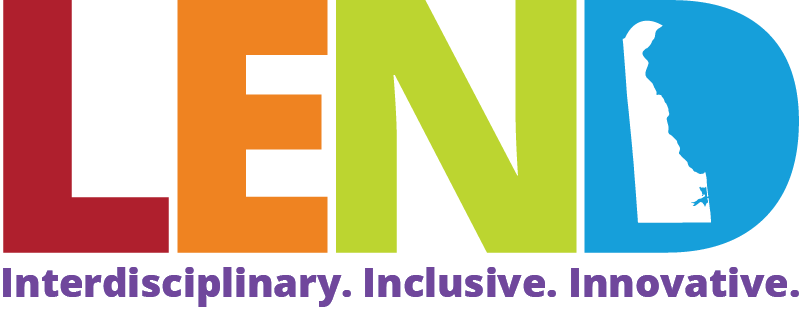
Leadership Education in Neurodevelopmental and Related Disabilities (LEND) program
Browse this collection of leadership project posters presented by past LEND cohort trainees.
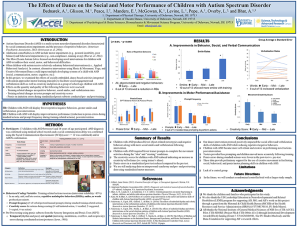
In this project, we examined the effects of socially embedded, dance-based activities integrated with autism approaches/motor learning principles to facilitate social engagement and verbalization skills as well as creativity and praxis in a group of school-age children with ASD.
Effects on the quantity and quality of the following behaviors were assessed:
- Training-related changes in repetitive behavior, social smiles, and verbalization rates
- Training-related changes in tester prompts and creativity scores
- Praxis on imitation errors during standardized praxis subtests conducted pre-and post-training.
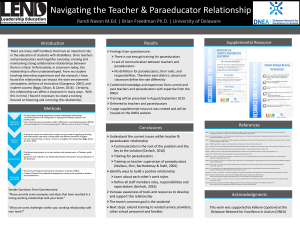
There are many staff members that have an important role in the education of students with disabilities. Since teachers and paraeducators work together everyday, creating and maintaining strong collaborative relationships between them is critical. Unfortunately, in classroom today, this relationship is often underdeveloped. From my student teaching internship experiences and the research, I have found this relationship can impact the work environment atmosphere, delivery of instruction (Giangreco, 2003), and student success (Biggs, Gilson, & Carter, 2016). Certainly, this relationship can affect a classroom in many ways. With this in mind, I found it necessary to create a training focused on fostering and nurturing this relationship.
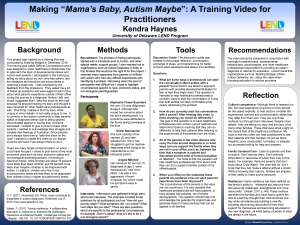
This project was inspired by a training that was conducted by Building Bridges in December 2018. The training was called Difficult Conversations and it was designed to show healthcare professionals how to approach the topic of developmental delays and Autism with parents. I participated in the training by telling my story about my son, who has autism, and the obstacles and emotions we encountered in obtaining a diagnosis. I was surprised by the feedback from the physicians. They asked me a lot of follow-up questions and were eager to learn more about what parents experience outside of their office during the journey to a diagnosis. Before I left, one doctor suggested that I “take this show on the road” because he enjoyed hearing my story and thought it was important for other health care professionals as well. One thing I realize is that my story, while unique in minor details, is not really uniqueto me. It is common in the autism community to hear parents speak of diagnosis delays due to being ignored, discriminated against or having their concerns dismissed. I wanted to give a voice to these other parents. I wanted to acknowledge their struggle and validate their feelings of frustration. Since parents don’t always have time to “take this show on the road” I wanted to create this video so our stories could be told even if we weren’t there to do it.
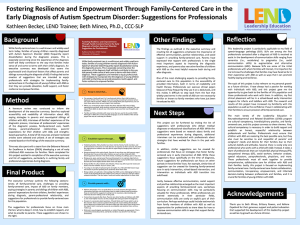
While family-centered care is a well-known and widely-used term today, families of young children recently diagnosed with Autism Spectrum Disorder (ASD) frequently report dissatisfaction during the diagnostic process. This is especially concerning since the experience of the diagnosis itself will likely contribute to the way that families make sense of and come to terms with their child’s diagnosis. An executive summary was developed that covers the psychosocial and situational factors that affect parents and siblings surrounding the diagnosis of ASD. Findings led to the creation of suggestions that are intended to equip professionals with strategies for implementing family-centered care in the diagnosis of young children with ASD so that they can provide education, build support, and foster resilience to empower families.
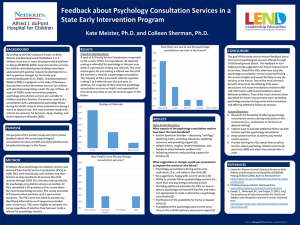
According to the CDC’s National Center on Birth Defects and Developmental Disabilities, 1 in 6 children have one or more developmental disabilities or delays (NCBDDD, 2018). Early intervention services for children with developmental delays have been associated with positive impacts on development as well as positive changes for the family and community (Goode et al., 2011). Child Development Watch (CDW) is a program in the state of Delaware that provides early intervention services for children with developmental delays under the age of three. As a part of CDW’s early intervention program, psychology consultation services are available to children and their families. The services consist of a consultation with a postdoctoral psychology fellow during the child’s initial in-clinic evaluation or during a home or daycare visit. The most common reasons for referral are concerns for behavior, sleep, feeding, and Autism Spectrum Disorder (ASD).
